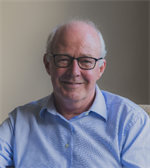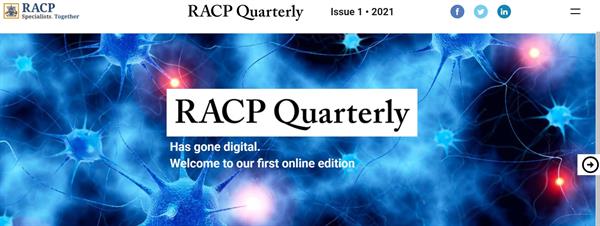The President's Message – 14 May 2021
This speech was delivered at Brisbane Convocation, but due to the positive feedback about it being an important message, it is being shared with the entire membership.
I need to talk to you today about a very important issue that relates to our newest Fellows. The life of a physician is not easy. Yes, wonderfully rewarding and a great privilege, but it is not (and has never been), a gravy train. That being said, some years in the life of a physician are harder than others – especially the early years.
I can only imagine the mountains of endeavour our newest Fellows have climbed to reach this high point in their careers. Much of that mountain is unavoidable: there’s just so much that we have to master on that long climb to qualify as a general practitioner – let alone a physician. But there is no need to suffer avoidable hardships. And that’s what I want to talk about today – our shared responsibility to make our workplaces safe and respectful.
I want to talk about the values we swear by as medical professionals – and the need for us all to live by those values. Because, collectively, we have allowed our values to be silent for too long – and silent values are not values at all.
Silent values
Let me explain. The lives of young doctors have been in the news a great deal in recent months. We all know how hard medical life can be, don’t we? I won’t ask for a show of hands from any of you about how difficult that can be. But we have to overcome bullying, harassment and discrimination.
I wonder how many of us have been so tired that we feared making a medical error, or crashing our car on the drive home. I wonder how many of us struggled to juggle the demands of parenting, training and working. And I wonder why so many of us feel we have to put up with these avoidable hardships. After all, training-by-hazing does not make anyone a better physician. It does not improve patient outcomes. Nor is it in line with the values of our profession.
The guiding principle of the College is:
Hominum servire saluti
To serve the health of our people
Bullying, harassment and discrimination – none of that serves the health of doctors or patients. The point I am making is this: our values cannot be silent. We have a shared responsibility to speak and to act. The culture is starting to change. People have greater awareness. And that cultural change and greater awareness will serve the health of all of us.
Break the silence
We need to re-write Supporting Physicians’ Professionalism and Performance. We need a longer-term campaign for cultural change within our profession. We need to give our trainees and Fellows the workplace that they deserve – a place that is safe and inclusive of that values that delivers quality of care. It is not easy, I know that, but with the pandemic – these are trying times.
Many of us work under great pressures in our practice, in our administrative roles. Finding time is difficult. Time to think about those values and cultural change, but we must do it because we are leaders and because it is up to us to maintain standards of care and culture. It’s up to us take responsibility – and break the silence.
We must also learn more about systemic barriers to gender equity in our profession, and we must dismantle those barriers. A College poll in 2019 told us that our members, male and female consider our College to play an important role here. I am very proud that our College has convened a Gender Equity in Medicine Working Group looking at this issue. They will recommend actions for us to take to achieve gender equity within our profession.
In conclusion, let me come back to our New Fellows. Back in the 1980s, when the late Priscilla Kincaid-Smith, a former mentor of mine, stood here as President of this College, she said:
‘The history of our College is the history of our Fellows.’
Think about what that means. This College is not the bricks and mortar of 145 Macquarie Street in Sydney. It’s not the Zoom rooms we meet in. It’s not the papers and policy position papers we publish. This College is you.
To be more precise, it’s the gap between the things you’ve been trained to do – and the things you actually go out there into the world and do. It’s about how close we come to attaining the ideals of the profession that generations of physicians before us have practised. It’s about realising that we are standing on the shoulders of those brilliant men and women who went before us. And about taking a shared responsibility to help the next generation stand tall on our shoulders. It’s about a continuity of excellence in care than is measured in generations.
And now it is the turn of your generation, take your place. Once again, congratulations to all those who have recently become New Fellows and to those who have worked hard as Fellows over the years.
Professor John Wilson AM
RACP President
The College Education Committee has now confirmed the delivery format for the 2021 Divisional Clinical Examination in Australia. We have decided to go with different approaches for Adult Medicine and Paediatrics & Child Health due to differing circumstances.
The Adult Medicine exam will be delivered in the traditional face-to-face format of two long cases and four short cases on the same day within candidates’ and examiners’ own state or territory. The Paediatrics & Child Health exam will use the modular format of two virtual long cases (by videoconference) and four face-to-face short cases on different days.
Eligible candidates, Directors of Physician Education and Examiners in Australia were sent a communication about the 2021 DCE last week. Applications will open on 18 May and close 31 May. Please check our website for more details including exam dates.
Find out more

RACP Congress 2021 is drawing to a close and the event truly lived up to the theme of Transformation: Adapting for the future, with a hybrid format designed to bring the Australasian specialist community together, despite the challenges brought about by the COVID-19 pandemic.
The combination of virtual and in person events, has proven to be a success with all members enjoying the flexibility of having events hosted close to them. This combined with the virtual aspect has given an amazing level of flexibility to those who wanted to get the most out of the Congress experience.
Launching in Brisbane, the sessions opened with the Welcome to Country and moved into a packed program. Incorporating all the Divisions and Faculties, the sessions not only provided valuable information and engaging discussions but provided many with their first face-to-face catch up with colleagues in over a year.
Moving across the countries, Adelaide, Perth, Melbourne, Sydney and Te Whanganui-a-Tara, Wellington were able to share hosting duties, allowing an even more diverse collection of experts the opportunity to join this year’s Congress.
With the final in-person session taking place in Te Whanganui-a-Tara, Wellington, and several more online sessions taking place over the next week, the future of Congress has never looked brighter. We would like to thank all the sponsors, Microsoft, William Buck, Novartis, Rural Doctors Association of Australia, HealthShare, MIPS, Nobel Oak, Avant Mutual, MedicMall, 1 Medical and Carol & O’Dea Lawyers who helped to make this event possible.
-0284.jpg?sfvrsn=64b9c11a_0&MaxWidth=&MaxHeight=150&ScaleUp=false&Quality=High&Method=ResizeFitToAreaArguments&Signature=7A8D84012CD7B3F7D22D55D28A6013749082989A)
-0436.jpg?sfvrsn=77b9c11a_0&MaxWidth=&MaxHeight=150&ScaleUp=false&Quality=High&Method=ResizeFitToAreaArguments&Signature=6484ADA12CA37727402FAF64465D1DA1795D1C1A)

We are pleased to announce that on Lung Health Awareness Month, the latest Evolve ‘Top-5’ recommendations on low-value practices in thoracic medicine were launched. The new Evolve thoracic recommendations span a range of conditions, ranging from common, such as COPD, to rare, such as sarcoidosis. These recommendations have been developed to reduce key low-value tests and interventions in the practice of thoracic medicine, but will also be of interest and applicable to care provided by clinicians beyond the specialty.
These recommendations were developed to reduce key low-value tests and interventions in the practice of thoracic medicine but will be of interest and applicable to care provided by clinicians beyond the specialty.
The new recommendations say:
- Do not perform a D-Dimer in patients at high risk of pulmonary embolism.
- Do not use long term systemic corticosteroids for management of chronic obstructive pulmonary disease (COPD).
- Do not initiate maintenance inhalers in minimally symptomatic COPD patients with a low risk of exacerbation.
- Do not routinely follow-up solid pulmonary nodules smaller than 6mm detected in low- risk patients.
- Do not perform a serum ACE for the diagnosis or monitoring of sarcoidosis.
We ask clinicians to think about how these recommendations are relevant to them. Consider:
- making the recommendations a routine part of clinical handovers
- including recommendations in education sessions like grand rounds, workshops, clinical case reviews, team meetings and more
- undertaking a clinical audit and feedback project on a recommendation
- discussing the recommendations with referring doctors and your multidisciplinary care team
- undertaking research on the recommendations.
If you would like to be more involved in shaping Evolve, consider joining the Evolve Policy Reference Group. The RACP regularly consults, collaborates and partners with Fellows and trainees in the Evolve Policy Reference Group. The group plays an important role in leading and shaping Evolve to make it more relevant and fit-for-purpose. Email evolve@racp.edu.au to find out more.
Read the recommendations
The RACP, through Evolve, is a founding member of Choosing Wisely Australia, with all Evolve ‘Top-Five’ recommendations part of the Choosing Wisely campaign. Registrations close today Friday, 14 May 2021, for the following pre-eminent healthcare events.
NMS 2021
The virtual NMS 2021 on Tuesday, 18 May 2021 has the theme ‘Evaluating quality use of medicines: How do we know if we’re making a difference?’ The program includes eminent journalist, broadcaster and facilitator Jenny Brockie as MC, as well as keynote presentations from:
- Professor Michael Kidd, Deputy Chief Medical Officer for the Australian Government on ‘What does success in quality use of medicines look like?’
- Associate Professor Melissa Baysari, Human factors researcher at the University of Sydney on ‘The role of digital health in supporting QUM’
- Dr Diane Watson, Chief Director at the Bureau of Health Information on ‘Measuring the impact of complex change programs in healthcare: insights for QUM’.
Registration is $100 and includes exclusive access to online networking opportunities during the live event and recordings of the presentations post-event. Register now at the NMS 2021 website.
Choosing Wisely Australia National Meeting
The virtual Choosing Wisely Australia National Meeting on Wednesday, 19 May 2021 has the theme ‘Empowering consumers to choose wisely’. The program includes eminent journalist, broadcaster and facilitator Hamish Macdonald as MC, as well as keynote and plenary presentations from:
- Tara Montgomery, public health advocate and communications strategist on ‘Global perspective on the importance of trust as a factor in the success of international efforts to reduce unnecessary care’
- Professor Alex Broom, Professor of Sociology at the University of Sydney on ‘Systems and organisational challenges’
- Professor Kirsten McCaffery and Professor Julie Leask of the University of Sydney on ‘Has the COVID-19 pandemic led to more health literate and engaged consumers?’
- Professor Jeffery Braithwaite, Founding Director of the Australian Institute of Health Innovation on ‘What are the future trends in healthcare and what does it mean for empowering consumers?’
Registration is $100 and includes exclusive access to online networking opportunities during the live event and recordings of the presentations post-event. Register now at the Choosing Wisely Australia National Meeting website.

Applications for the 2022 funding round opened on 3 May 2021. Upwards of 50 awards up to a total value of $2.5M are available across the different categories:
Applications for the following other award categories will open Tuesday, 1 June 2021:
Neil Hamilton Fairley Medal
The Neil Hamilton Fairley Medal is awarded by the RACP every five years to recognise an individual who has made outstanding contributions to the field of medicine. The medal was last awarded to Professor Roger Reddel in 2017, and nominations for the 2022 award are now being accepted. This award is open to both RACP Fellows as well as individuals outside the College. However the nominee must be nominated by a Fellow of RACP to be considered.
Details on the application process and selection criteria is available online. Nominations close on Tuesday, 31 August 2021.
We would like to congratulate the Fellows and trainees who have been recognised through the RACP College Prizes.
The John Sands Medal 2021
 Professor Gregory Crawford
Professor Gregory Crawford
Professor Crawford is a long-standing contributor to the RACP. He has been involved with the Palliative Medicine Education Committee for eight years and currently has an ongoing five-year involvement with the Chapter of Palliative Medicine, including a Presidency from 2018 to 2020. He is currently on the RACP Council and has had several RACP positions. He has advocated for palliative medicine and collaborated with many stakeholders to ensure optimal care is provided for our population.
The RACP encourages its members to educate, advocate and innovate. Professor Crawford has demonstrated that he has fulfilled this call in every facet of his professional career. His work at the University of Adelaide demonstrates his dedication to teaching and learning. His Presidency of the Chapter of Palliative Medicine and positions with peak state and national palliative care bodies highlight his advocacy for better care for vulnerable members of our society. His innovation has been evident in his research activities and his ability to integrate palliative care into the undergraduate curriculum. Furthermore, he has also inspired trainees, Fellows and College staff to achieve more than they expected through a mixture of gentle encouragement, humour and wisdom.
The College Medal 2021
 Professor Roderick MacLeod MNZM
Professor Roderick MacLeod MNZM
Professor MacLeod was a Foundation Fellow of the Australasian Chapter of Palliative Medicine, helped develop the Asia Pacific Hospice Network, and was appointed New Zealand’s first Professor in Palliative Care in 2003. He was involved in the development of the palliative medicine curriculum during his time on the Palliative Medicine Education Committee and provided expertise to the College’s Supervisor Professional Development program.
During Professor MacLeod’s career, he has been internationally recognised for his work in medical education, highlighting the importance of holistic end-of-life care. He has influenced evidence-based practices and policies in palliative care at state, national and international levels, and has contributed to the debate against the legalisation of euthanasia and physician-assisted dying. His Palliative Care Handbook remains a popular resource for clinicians and is now in its ninth edition. His international collaborations led to the Textbook of Palliative Care that he co-edited in 2019. His extensive academic and educational credentials have contributed to an international palliative medicine network for Aotearoa New Zealand and Australia. In recognition of his contribution to palliative care in Aotearoa New Zealand, Professor MacLeod was appointed Member of the New Zealand Order of Merit in 2015.
- Professor Gregory Fox - RACP International Medal 2021
- Dr Allan Kerrigan - RACP Medal for Clinical Service in Remote and Rural Areas 2021
- Professor Prashanthan Sanders - The Eric Susman Prize 2020
- Dr David Levitt - RACP Mentor of the Year Award
- Dr Davina Buntsma – RACP Trainee of the Year Award
Trainee Research Award Recipients in the field of Adult Medicine
- Dr Stephen Bacchi (SA)
- Dr Elie Matar (NSW/ACT)
- Dr Hashrul Rashid (VIC)
- Dr Michael Thompson (TAS)
- Dr Chani Tromop van Dalen (AoNZ)
- Dr Oleksandra Voloshyn (WA)
- Dr Hong Wu (QLD)
- Dr Chris Xu (NT)
Trainee Research Award Recipients in the field of Paediatric Medicine
- Dr Alyssa Courtney (QLD)
- Dr Lilian Downie (VIC)
- Dr Lucinda Marks (NSW/ACT)
- Dr Meghan Sandle (AoNZ)
- Dr Charles Sparrow (TAS)
- Dr Jonathon Tang (SA)
- Dr Sathyakala Vijayanand (WA)
- Dr Natalie Wright (NT)
The Trainee Research award presentations are available on-demand now, access them through the Virtual Congress portal if you've purchased a ticket.
You are invited to attend our upcoming presentation on Digital Health Tools hosted by Australian Digital Health Agency (ADHA) and Avant Mutual on Saturday, 29 May from 10am to 12pm AEST.
This two-hour interactive session will commence with a presentation on National Digital Health Strategy priority initiatives such as My Health Record and electronic prescribing by ADHA, followed by telehealth and how its practices have changed rapidly since the COVID pandemic and continue to evolve in interesting ways by Avant Mutual.
Register now
The Digital Health Cooperative Research Centre (DHCRC) kicked off a series of virtual events covering hot topics in the field of Practice Analytics on 21 April. Please listen to the recording of the inaugural webinar ‘Using health data for practice reflection: Changing expectations on the role of data in professional development’. The webinar discussed the potential use of health data for practice reflection and professional development.
The panel included Anne Tonkin (Medical Board of Australia), John Wilson (RACP President), Julian Archer (Executive General Manager for Education at the Royal Australasian College of Surgeons) David Rankin (Director Clinical Governance and Informatics at Cabrini Health), Robert J. Birnbaum (Mass General Brigham at Harvard Medical School) and was chaired by Tim Shaw (Director of Research at DHCRC).
The Advocate’s Journey is a five-part mini documentary series which follows Dr Robert Lethbridge, as he sets out to interview some well-known physicians who have taken the leap into advocacy and achieved remarkable outcomes from their work. Dr Lethbridge is a paediatric respiratory and sleep physician at Perth Children’s Hospital.
Tune in to watch engaging interviews with Dr Helen Young, Professor Fiona Stanley, Dr Graeme Edwards and other respected advocates and experts. Throughout the series, learn about other doctors' experiences and gain expert advice on how physicians can become advocates. The series also explores how to engage key stakeholders, get issues on the public agenda, and the results of advocacy.
The documentary episodes are also available now on Medflix.
Watch now

RACP Quarterly is our member magazine featuring healthcare and medical news. We’ve gone digital – welcome to our first online edition. In this issue we feature ‘Make It The Norm – a call for health equity in Aotearoa New Zealand’, ‘Fellows on the ground – social determinants, children, and health equity’ with Dr Jacqueline Small and Associate Professor Sue Woolfenden.
Other highlights include ‘Our College’s learnings from COVID-19’, ‘RACP Congress 2020: First People’s Health’ and the 2021 Howard Williams Medal winner, Professor Anne Chang.
Also included in this issue are our 26 RACP Fellows recognised in the 2021 Australia Day and Aotearoa New Zealand New Year Honours lists. We also congratulate Professor Brendan Murphy who is the ACT state recipient of the Australian of the Year 2021. This issue also includes the list of RACP Foundation 2021 Research Award recipients. You can also access previous issues of RACP Quarterly on the RACP website.
Read online now

We’re hosting more online events than ever before, so have introduced a condensed monthly events digest. The May digest was emailed to you, but you can also read it online.
This monthly communication will be sent to you on the first Wednesday of each month, to provide you with an opportunity to virtually attend events from all over Australia and Aotearoa New Zealand. We hope this makes your life that little bit easier and we look forward to seeing you at our next event.
Discover May events
Advance care planning should be a routine part of clinical practice, but it can be challenging to know where to start. End of Life Law for Clinicians and Advance Care Planning Australia recently launched a quick guide for health professionals on how to do advance care planning. How to do Advance care planning: A quick guide provides health professionals access with useful advance care planning resources intended to embed planning in routine clinical practice.
The Australian Commission on Safety and Quality in Health Care has released new fact sheets for clinicians: End-of-life care: Last days of life and End-of-life care: Clinical basics. The fact sheets are designed to help clinicians provide optimal care during this stage of life so that the interventions provided to patients focus on maintaining comfort, anticipating and managing symptoms, stopping interventions that are not beneficial and providing appropriate emotional and psychological support.
Sunday, 23 to Saturday, 29 May 2021
The theme of this year’s National Palliative Care Week, ‘Palliative Care: It’s more than you think’, seeks to raise awareness about the benefits of quality palliative care. The theme seeks to broaden the community’s perceptions, understanding and appreciation of palliative care and its role in supporting the diverse needs of people living with a life-limiting illness, improving their quality of life and helping them to live as well as possible for as long as possible.
National Palliative Care Week also presents an opportunity to highlight the work of the Australian palliative care community which comprises practitioners across the full spectrum of disciplines who care for people who are dying or living with a life-limiting illness. Palliative care clinicians and workers can be instrumental in balancing a variety of perspectives and incorporating the physical, psychological, social and spiritual concerns of patients, their families and the staff caring for them.
For more information about National Palliative Care Week and its goals, visit the Palliative Care Australia website.
Gender can be considered a social determinant of health, in the different pressures and expectations it puts on women and men. For example, the taboos around menstruation are so profound that many young women are dangerously naïve about their own reproductive health. Meanwhile, endometriosis, chronic fatigue syndrome, and other conditions associated with chronic pain have a stigma around them that means self-reports are often not taken seriously by health professionals. Historic notions of hysteria have a more profound impact on medical thinking than we might imagine, and in this podcast we ask what can be done to erase these.
Listen now
The early view of the May 2021 Journal of Paediatrics and Child Health is now available.
Key highlights include:
-
Role of cross‐campus multidisciplinary team meetings in decision‐making for children and adolescents with differences of sex development/intersex.
-
Ustekinumab Dose Intensification in Paediatric Crohn's Disease
Patient, staff empowerment and hand hygiene bundle improved and sustained hand hygiene in hospital wards
- Evaluation of parameters associated with growth retardation in children with coeliac disease.
Read now
The April 2021 issue of the Internal Medicine Journal is now live. This month’s editor's choice is an original article titled Factors that predict glycaemic response to sodium-glucose linked transporter (SGLT) inhibitors.
Key highlights from the issue are:
- Anti-cancer therapy made easier: A 25 year update
- Current approach to acute stroke management
- Dialysis dependent chronic kidney disease and critical care
- Medication and cognitive impairment among residents of aged care facilities
- Group A streptococcal bacteraemia: an under-reported risk group
- Surgical treatment of non-small-cell lung cancer in octogenarians.
Read now
Expressions of Interest are still open for Fellows in the Adult Medicine and Paediatric & Child Health Divisions to join our team of accreditors. As an accreditor, you play a vital role in ensuring the delivery of high-quality workplace training. Your contribution to accreditation can also count towards your annual CPD credits.
Please submit an Expression of Interest (EOI) form by Wednesday, 30 June to accreditation@racp.edu.au (Australia) or accreditation@racp.org.nz (Aotearoa New Zealand).
Each College Learning Series (CLS) lecture must pass clinical review before it is uploaded. To assist with these reviews, we are currently seeking PCHD Advanced Trainees and Fellows. Interested members are invited to email CLS@racp.edu.au for further information and to apply.
 As healthcare professionals ourselves, we understand how time-consuming it is for practice owners and managers to purchase products and services. It's difficult to deal with multiple suppliers, negotiate the best deals and then place and manage orders across a variety of different channels. We know that today's healthcare businesses are under more pressure than ever and that the more time you spend on routine tasks, the less time you have to focus on what matters most to you – patient care.
As healthcare professionals ourselves, we understand how time-consuming it is for practice owners and managers to purchase products and services. It's difficult to deal with multiple suppliers, negotiate the best deals and then place and manage orders across a variety of different channels. We know that today's healthcare businesses are under more pressure than ever and that the more time you spend on routine tasks, the less time you have to focus on what matters most to you – patient care.
We've made it our mission to give the healthcare community a smarter way to purchase premium products and services by creating MedicMall. Instead of running all over town (or the web) or making multiple phone calls to find what you need, MedicMall is your one-stop-shop giving you access to a handpicked trusted network of national suppliers, offering very competitive prices.
Sign up now to become a member – it's free to join, and receive exclusive member pricing, discounts, and offers.
Stay informed
Read other RACP eBulletins: